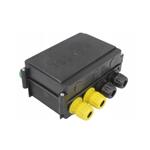Description
A junction box is a critical component in any electrical installation, designed to securely contain wire connections and protect them from various environmental factors. These boxes are essential for maintaining the integrity of an electrical system, ensuring that connections are not exposed to potential damage from moisture, dust, or physical interference. Junction boxes come in various types and materials, each suited to different applications and environments. For instance, plastic junction boxes are known for their non-conductive properties and resistance to corrosion, making them ideal for residential and commercial settings where lightweight and durable solutions are preferred. On the other hand, metal junction boxes offer increased durability and protection against fire and mechanical damage, which is why they are often used in industrial settings or areas where additional safety measures are necessary.
When selecting a junction box, it's important to consider factors such as the material, size, and type of box needed for the specific electrical setup. The protection rating of the junction box is also a crucial aspect, as it indicates the level of safety and durability against environmental conditions. Some junction boxes are designed to be waterproof, which is particularly important for outdoor installations or areas prone to dampness. Additionally, the way wires are connected within the box, the number of terminals, and the overall design can greatly influence the ease of installation and future maintenance.
In summary, a junction box is an indispensable safety feature for any electrical system, providing a neat and organized way to manage wire connections while ensuring compliance with safety standards and regulations. Whether for a simple home setup or a complex industrial application, choosing the right junction box is key to a safe and efficient electrical system.




